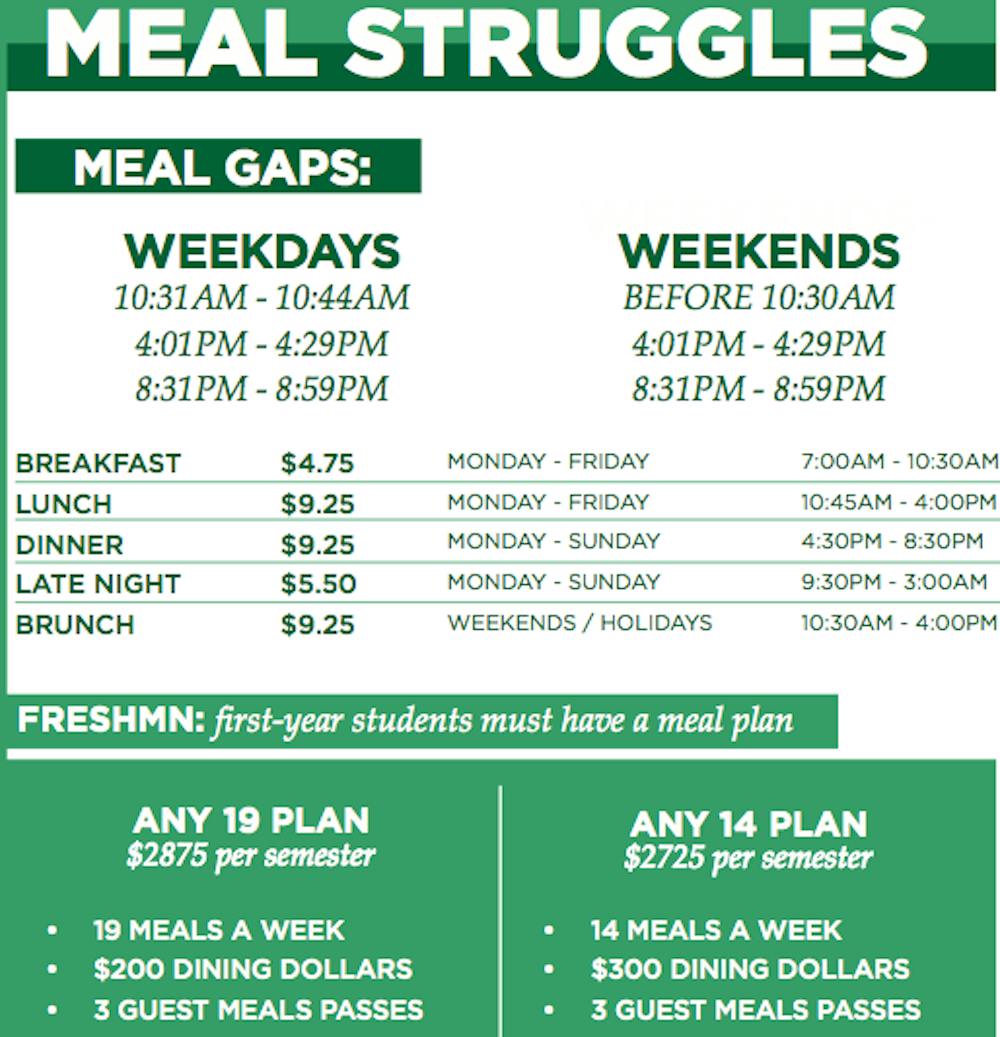When students are running late for breakfast and the clock hits 10:46 a.m., it is officially too late for them to use their breakfast meal credit.
On weekdays, students can use a breakfast meal swipe from 7 a.m-10:30 a.m. If a student wants to purchase a meal between 10:30 a.m.-11:00 a.m., they must use dining dollars or campus cash. Campus Dining and Shops (CDS) implements these half-hour gaps during which students cannot use a meal credit three times a day. SA Assembly is currently petitioning CDS to have these time gaps removed.
Students feel they should be able to use their meal credits whenever they want. Freshman biomedical sciences major Sara Kolinski said the convenience of the meal plan depends on a student’s personal schedule.
“In reference to my class schedule, the meal hours do work for me during weekdays, but weekends when I don't have class it tends to be more inconvenient. I would personally just love to be able to use my meal credits whenever. It would make things a lot more simple,” Kolipinski said.
Tyler Kluepfel, a sophomore accounting major, said students tend to have hectic schedules that conflict with the meal plan hours.
“It can be inconvenient and I definitely feel like I spend more money during unrestricted hours. Even when I can't use my meal credits, I still want to buy food,” Kluepfel said.
Last semester, SA Assembly passed a resolution to remove meal plan time gaps. They are currently gathering student signatures for a petition asking CDS to remove the meal plan time gaps.
Speaker of the Assembly, Mike Brown, believes students should be able to use their meal credits whenever it is convenient for them and CDS should adhere to the student's schedule rather than the other way around.
“It's not an ideal scenario they have given to us, that people can'tuse a credit that they have already paid for,” Brown said.
Raymond Kohl, CDS marketing manager, said CDS strives to provide the best value and convenience for students, especially campus residents. He also said meal plans help students, especially incoming freshman, feel more organized in terms of planning their time and meal budget.
“We have the time gaps for organization purposes. With the meal plan the way it is, we can look over meals from each time frame and know exactly how much we need to order for next time. The time gaps help keep things efficient,” Kohl said.
Brown said CDS often cites “technological issues” as a reason for not having as much flexibility with meal plan time gaps.
“They blamed technology for not being able to support a change in the system, which to be honest, I think they're being incredibly untruthful about. I have many friends who work or have worked in campus dining, and from what I've experienced, cashiers reallycan take meal credits whenever,” said Brown.
In response to Brown’s statement, Kohl said he is unsure of where Brown is getting his information and believes it to be untrue.
“That's not the case, no. The technology is a solid argument. You can't charge different meal periods at different times. Cashiers can't do that. There's different values with different meals,” Kohl said.
Matthew Eichhorn, computer science major and Assembly member, would prefer to use dining dollars instead of meal credits. He said if you're late, you miss a meal, but with dining dollars there is no risk of money being wasted.
“It's just frustrating when policies limit the way we can use the money that we paid for.We should be able to use our own money in the way that's most convenient for us,” Eichhorn said.
Brown also thinks doing away with meal credits altogether and switching to dining dollars is a good idea.
“Personally, I think that just doing dining dollars [instead of meals] would be a lot better, because then you get just what you pay for. Otherwise, it's like a monopoly, trying to get students to spend as much money as they can, and not giving them back the full value of what they spend either,” Brown said.
Brown and Eichhorn think CDS is trying to take on a parental role for students.
“That's not their place, that is simply not their role, and that's the same impression we're getting with these meal times, even the meal credits system in general,” Brown said.
Kohl said CDS does offer upper-classmen the option of having dining dollars instead of meal credits. CDS has tried offering the dining dollars option to underclassmen, but found students generally did not like that option.
“With the dining dollars, students would blow through the money and then not have enough left for the rest of the semester, then they'd have to call home and ask parents for more money. The meal plans are essentially a more economical way for students to purchase food,” Kohl said.
Brown said the Assembly will follow up with students who sign their petition by inviting them to discuss the meal plan time gaps issue and voice their concerns at an Assembly-hosted town hall after spring break.
Ema Makas is a staff writer and can be reached at news@ubspectrum.com





